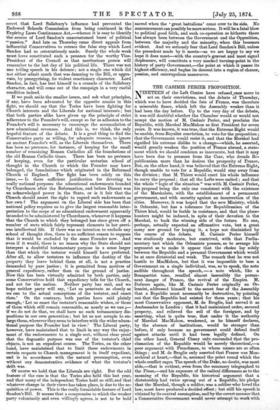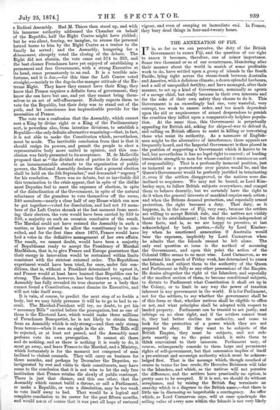THE CAS111111 PERIER PROPOSITION.
NINETEEN of the Left Centre have refused more to act on their convictions, and the debate of Thursday, which was to have decided the fate of France, was therefore a miserable fiasco, which left the Assembly weaker than it had been the day before. Up to the very day of the debate, it was still doubtful whether the Chamber would or would not accept the motion of M. Casimir Perier, and proclaim the Republic, with Marshal MacMahon as first President for seven years. It was known, it was true, that the Extreme Right would be unable, from Royalist conviction, to vote for the proposition ; that the Government would resist it, and that the Marshal had signified his extreme dislike to a change—which, he asserted, would greatly weaken the position of France abroad, a state- ment which we should condemn as inaccurate, but that it may have been due to pressure from the Czar, who dreads Re- publicanism more than he desires the prosperity of France. But, on the other hand, it was believed that the Extreme Right, though unable to vote for a Republic, would stay away from the division ; that M. Thiers would exert his whole influence to carry the proposal ; that all the Lefts were united ; and that the whole " logic of the situation" was with M. Casimir Perier, his proposal being the only one consistent with the existence of the Marshalate, with the establishment of a permanent government, and with security against an insurrection of the cities. Moreover, it was hoped that the new Ministry, which is Orleanist, but has a tolerance for Republicanism of the Thiers kind, would be feeble in resistance, and that the place- hunters might be induced, in spite of their devotion to the Marshal, to back the winning side of the future. No one, perhaps, actually expected an affirmative vote, but a great many saw ground for hoping it, a hope not diminished by the course of the debate. M. Casimir Perier himself was studiously moderate, but contrived, with that Parlia- mentary tact which the Orleanists possess, so to arrange his argument as to make it appear that the choice lay solely between the Republic and a personal Government which would be at once dictatorial and weak. The remark that he was not hostile to MacMahon, but that it was impossible to base a Government on a single individual, was, so to speak, the note audible throughout the speech, —a note which, like a Bonapartist tune, recalled almost insensibly the perma- nent danger of France, the revival of the Empire. M. Dufaure again, like M. Casimir Perier originally an Or- leaniet, addressed himself to the secret fear of the Assembly that a Republic must necessarily be destructive, by pointing out that the Republic had existed for three years ; that his most Conservative opponent, M. de Broglie, had served it as Ambassador in London ; that it had maintained order, secured property, and relieved the soil of the foreigner, and by asserting, what is quite true, that under it the authority of Marshal MacMahon, weakened, as he himself declares, by the absence of institutions, would be stronger than before, if only because no government could defend itself against attacks until it had been legally defined. On the other hand, General Cissey ontv contended that the pro- clamation of the Republic would be merely theoretical,—a poor argument with Frenchmen, to whom names are so often things ; and M. de Broglie only asserted that France was Mon- archical at heart,—that is, assumed the point round which the whole conflict rages. The speech of the Duke, no doubt, was most able,—that is evident, even from the summary telegraphed to the Times,—and his exposure of the radical differences as to the meaning of the Republic, his historical argument that a dictatorship had twice sprung out of a Republic, his pledge that the Marshal, though a soldier, was a soldier who loved the law, must have produced a decided effect ; but still his speech is vitiated by its central assumption, and by the covert menace that a Conservative Government would never attempt to work with a Radical Assembly. Had M. Thiers then stood up, and with ' his immense authority addressed the Chamber on behalf of the Republic, half the Right Centre might have yielded ; but he was silent, fearing, we imagine, to arouse the personal hatred borne to him by the Right Centre as a traitor to the family he served ; and the Assembly, hungering for a denouement, abruptly voted the closing of the debate. The Right did not abstain, the vote came out 374 to 333, and the best chance Frenchmen have yet enjoyed of establishing a permanent and free Government, with a strong Executive at its head, came prematurely to an end. It is a terrible mis- fortune, and it is due,—for this time the Left Centre voted straight,—mainly to the dog-in-the-manger attitude of the Ex- treme Right. They know they cannot have their King, they know that France requires a definite form of government, they know she can have but one, and yet they cannot bring them- selves to an act of self-effacement. Nobody expects them to- vote for the Republic, but their duty was to stand out of the path, and let consciences less impracticable provide for the necessities of France.
The vote was a confession that the Assembly, which cannot seat a King by divine right or a King of the Parliamentary sort, is powerless also from intestine divisions, to establish a Republic—the only definite alternative remaining—that, in fact, it is not able to make the Constitution which, nevertheless, must be made. The inevitable conclusion from that is that it should resign its powers, and permit the people to elect a representative body more united in opinion, and this con- clusion was fairly presented to its acceptance. M. de Malleville proposed that as " the divided state of parties in the Assembly is an insurmountable obstacle to the organisation of public powers, the National Assembly declares that a general election Rh-nil be held on the 5th September," and demanded "urgency" for his resolution. There was no debate, but so inevitable did this termination to the crisis appear, that in spite of the dislike most Deputies feel to meet the expenses of election, in spite of the disinclination of the Government, in spite of the natural reluctance of the grandees to vote themselves off the scene, 340 members—nearly a clear half of any House which can now be got together—voted for dissolution, and had not 19 mem- bers of the Left Centre shrunk at the last moment from meet- ing their electors, the vote would have been carried by 359 to 350, a majority on such an occasion conclusive of the result. The Marshal could not have resisted the Assembly in such a matter, or have refused to allow the constituency to be con- sulted, and for the first time since 1870, France would have had a voice in the definitive management of her own affairs. The result, we cannot doubt, would have been a majority of Republicans ready to accept the Presidency of Marshal MacMahon, that is, to give France and Europe guarantees that their energy in innovation would be restrained within limits consistent with the strictest external order. The Republican experiment would have been tried, for once, under fair con- ditions, that is, without a President determined to uproot it, Dance ance would at least have learned that Republics can be strong. The chance, however, has been thrown away, and the Assembly has fully revealed its true character as a body that cannot found a Constitution, cannot dismiss its Executive, and will not take itself away.
It is vain, of course, to predict the next step of so feeble a body, but we may fairly presume it will be to go to bed to re- cruit. The Marshal-President will try, no doubt, to get his " necessary Bills " carried before the prorogation, but as one of them is the Electoral Law, which would make three millions of Frenchmen Bonapartist, he is not likely to obtain them from an Assembly which is only strong—and then only strong from terror—when it sees an eagle in the air. The Bills will be rejected, or at least not passed, and the Assembly must perforce vote its own prorogation. It cannot sit there and do nothing, and as there is nothing it is ready to do, it must go away, and leave France to the Marshal, and a Ministry, which fortunately is for the moment not composed of men inclined to violent counsels. They will carry on business for three months, and perhaps by December the Deputies, re- invigorated by rest and visits to their constituents, may have come to the conclusion that it is not wise to let the only free institution that France retains die slowly of public contempt. There is just that chance, and this one other, that the Assembly which cannot build a throne, or call a Parliament, or make a Republic, or vote a dissolution, may be too weak to vote itself away to bed. That would be a logical and complete conclusion to its career for the past fifteen months, and would mean of course that it was past all hope of restored
vigour, and even of escaping an immediate end. In France, they bury dead things in four-and-twenty hours.



































 Previous page
Previous page